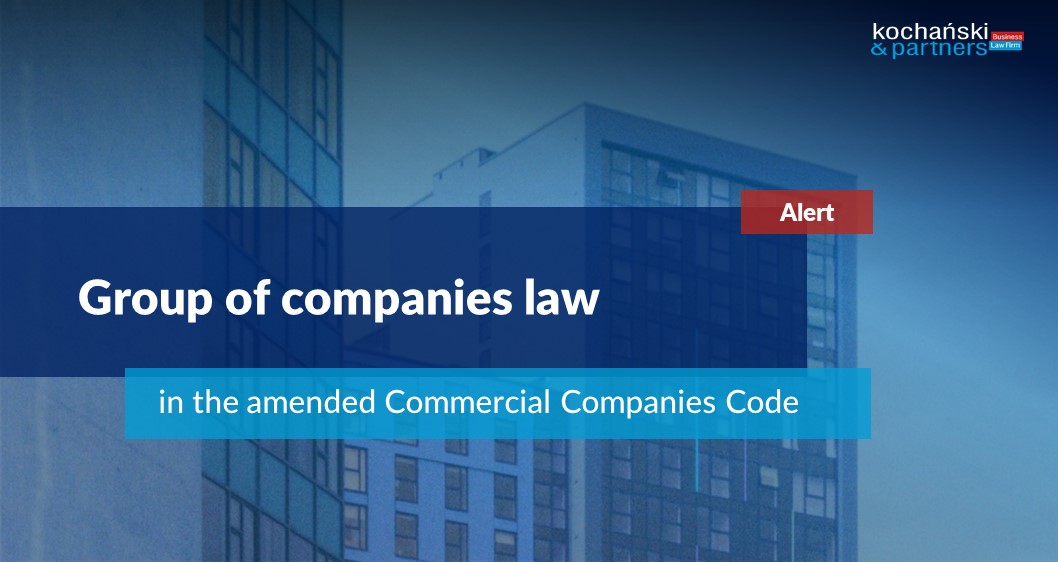
Group of companies law in the amended Commercial Companies Code
The Government Legislation Centre website has published the final version of the draft amendment to the Commercial Companies Code, which is to introduce the group of companies law into the Polish legal system. The draft is expected to be submitted to Parliament as early as this January.
Below you will find a summary of the most important provisions.
General information
Location of provisions: Title I Chapter IV: “Group of companies”, Articles 21(1) – 21(16).
Nature of provisions: voluntary.
Scope of application: partnerships, capital companies and, in respect of parent companies only: companies based outside of Poland, public companies, cooperatives, foundations, associations and natural persons carrying on business activity.
The provisions are not applicable to: public companies as subsidiaries, investment funds, local government units, the State Treasury.
Entry into force: 6 months from the announcement.
What is a group of companies and what entities is it composed of?
A group of companies is a parent company and its subsidiaries or affiliates having a common interest which they pursue under a common economic strategy, under the uniform management of the parent company.
Entry into and exit from, a group of companies
Through the adoption of a resolution by the shareholders’ meeting or the general meeting of a subsidiary, containing an identification of the parent company, by a majority of 3/4 of votes or by absolute majority if there is a quorum of 50%. To leave the group, it is sufficient for the parent company to make a relevant statement to the subsidiary.
Affiliates must in addition include information on their participation in a group of companies with an identification of the parent company in their articles of association.
With respect to third parties, participation in the group is effective from the moment of entry of the relevant note in the Register of Business Entities of the National Court Register.
What is the interest of a group of companies that a company can pursue after entering the group?
The interest of a group of companies is a separate category in addition to the company interest. It is a common interest shared by all group companies, relating to a common business strategy.
The draft does not provide for a common strategy to be included in corporate documents. The interest of the group must always be justified by the parent company issuing a binding instruction.
When can one be guided by the interest of the group and not by the interest of the company?
Only if this does not cause any harm to the creditors or minority shareholders of the subsidiary.
How can a parent company exercise uniform management over a subsidiary?
By giving binding instructions, which must be in writing to be valid. The instructions must specify the interest of the group and the expected benefits or losses for the subsidiary as a result of the execution of the instructions and the manner and time of remedying the losses.
What is the liability of members of the governing bodies if they act in the interest of the group and not in the interest of the company?
They will be liable under the existing rules if they act without a binding instruction and at the same time cause a loss to the company.
Their liability (Articles 293, 300(125) and 483 of the Commercial Companies Code) is excluded where loss is caused to the company through the execution of a binding instruction in accordance with the Code.
What about the execution of binding instructions?
The execution of a binding instruction where there are obligatory reasons to refuse its execution, will not exclude liability.
Instructions are executed following the adoption of a resolution by the management board of the subsidiary, which resolution must be justified by references to at least fragments of the binding instruction.
When is a company required to refuse a binding instruction?
The execution of a binding instruction is prohibited:
- if this would lead to insolvency of the subsidiary or threaten its solvency
- where there is a well-founded concern that this would be contrary to the interests of the company and would bring about a loss which would not be remedied by the parent company or group company within the next two years. In determining the value of the loss, the benefits derived from participation in the group in the last two years are taken into account (obligatory only for companies/partnerships having more than one shareholder/partner);
- where special regulations do not permit the execution of
a binding instruction: in particular, in cases where companies provide services to their clients in the field of regulated activities or are required by law to have an independent management.
Can a subsidiary refuse a binding instruction?
In cases other than those specified, a subsidiary (having more than one shareholder/partner) may refuse to execute a binding instruction.
This is possible in view of the general clause providing that a company may be guided by group interest only if this is not to the disadvantage of minority shareholders and creditors.
In the execution of such an instruction, decision-makers are exempt from liability for damages and criminal liability for loss caused to the company
Possibility of modifying the rules for refusing to execute a binding instruction
A resolution to amend the articles of association of a subsidiary may narrow down the cases of mandatory refusal to execute a binding instruction. Such a resolution requires approval by all shareholders/partners and the parent company’s buyout of those who do not agree to the change.
Who can invoke group interest?
Members of the Management Board, Supervisory Board, Audit Committee, holders of a commercial power of attorney, and liquidators.
Rights and obligations of the parent company towards its subsidiaries
The right to review books and documents at any time and to request information.
The obligation of the Supervisory Board (or, in its absence, of the Management Board), to supervise the pursuing of group interest by the subsidiary.
The parent company has the right to buy out minority shareholders/partners of the subsidiary if it holds 90% of the share capital. (The articles of association of the subsidiary may provide for a threshold of up to 75%, if minority shareholders/partners who do not agree to the change are bought out).
Rights and obligations of a subsidiary being part of a group
The obligation to provide information and documentation, unless otherwise provided for in specific regulations.
The obligation of the Management Board to draw up a report on the relationship with the parent company, including a specification of binding instructions.
A claim for damages against the parent company for loss on generally applicable terms and also where a binding instruction was not given in the interest of a group of companies.
Protection of minority shareholders/partners of a subsidiary
All shareholders/partners who do not accept stricter criteria for the mandatory refusal of a binding instruction being introduced into the articles of association, may exit the subsidiary.
Sell-out right in 90%-controlled companies/partnerships, to be exercised not more than once a year, not earlier than within 3 months of the disclosure of the relevant entry in the register, in accordance with Article 417 § 1, and with Article 418 (1) being applied accordingly. There is also the possibility of requesting the appointment of an auditor to determine the redemption price as at the date of the request.
Request for the appointment of an auditor to audit the accounts and the operations of the group.
A claim for damages against the parent company for causing a decrease in the value of shares through a binding instruction. This only applies to companies in which the parent company has a controlling interest enabling it to change the articles of association. Actio pro socio for the subsidiary in the event that the subsidiary fails to pursue the claim for damages.
Protection of creditors of the subsidiaries
A claim for damages against the parent company in the event that enforcement against the assets of a subsidiary was ineffective, provided that such enforcement is ineffective due to binding instructions.



